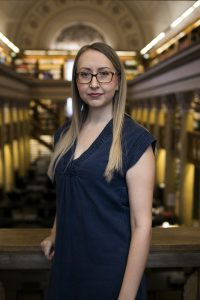 I am doctoral student in the Unit of Sociology, University of Helsinki. In my PhD research, I study an involuntary absence of a uterus and childlessness that originates from the condition. I explore how the phenomenon is constituted and framed in medical practices, legal processes and everyday life of the women in question. The study description you can find below.
I am doctoral student in the Unit of Sociology, University of Helsinki. In my PhD research, I study an involuntary absence of a uterus and childlessness that originates from the condition. I explore how the phenomenon is constituted and framed in medical practices, legal processes and everyday life of the women in question. The study description you can find below.
The research is part of the Academy of Finland research project Valuating Lives: Science, Law and Patient Activism on Infertility and Dementia (VALDA). This project studies how life is ordered and valued in the early and the last phases of life course. We analyze how in Finland, experts in bio-medicine and legislation and patients with their support communities account for and enact worthiness and normality regarding reproduction and aging. The principal investigator of the project is Assistant Professor Mianna Meskus. Other project members are Lotta Hautamäki, Riikka Homanen and Elina Helosvuori. My PhD study is also funded by Kone Foundation and The Oskar Öflund Foundation.
I graduated as a Master of Social Sciences (M.Soc.Sc.) from University of Helsinki in 2015. In addition, I am a Bachelor of Arts in Comparative Literature (BA). Among my other research interests are assisted reproductive technologies, family law and science communication.
My interest areas are family studies, sociology of the body, sociology of health and illness, disability studies and gender studies.
Study discription: THE POLITICS OF MISSING UTERUS. AN ETHNOGRAPHY OF A REPRODUCTIVE ABLEDNESS
My PhD research studies an involuntary absence of a uterus and childlessness that originates from the condition. I explore how the phenomenon is constituted and framed in medical practices, legal processes and everyday life of the women in question.
Each year in Finland, a number of fertile age women encounter involuntary hysterectomy or find out they have never had a uterus. The situation is dramatic because the indication for involuntary hysterectomy can be either a gynecological cancer or a life threatening complication during delivery, or it involves a teenage girl in the case of congenital absence of a uterus.
I want to bring the subject of uterine atypicalities under sociological scrutinity because there is an acknowledged need of extensive, research based discussion on the practices of health care policies and lack of social scientific research on the topic. I study womblessness as a phenomenon, which is not reduced being to a medical problem only but also relates to the realms of society and multiplicity of human life. I examine how the ability to procreate is understood in the age of ART, when procreation is possible also for women without a uterus.

I study the lack of uterus as a biological and social phenomenon using multi-sited ethnography as my research method. My research data consist of expert and patient interviews, articles in Finnish medical journals and legislative materials. I analyze the subject from multiple perspectives, which highlight the relevance of atypical anatomy both in the women’s everyday life and in science, medicine and society in general.
From the perspective of medical expertise, I inspect how womblessness is understood to affect on woman’s wellbeing and how the condition is suggested to treat. From the position of the women, I explore what it is like to live and operate in the society and health care services that assume a ‘normal’ female anatomy. I also study how assisted reproductive technologies and peer support take part in women’s life, formulate their comprehension of their bodily abilities and affect on their possibilities to have a child.